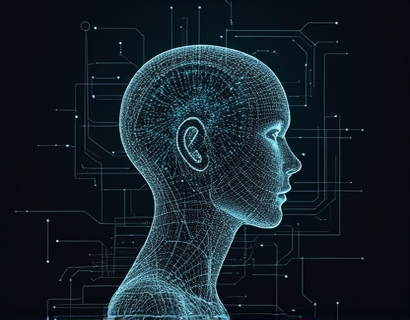Revolutionizing Business Analytics with AI and Blockchain: A Secure and Transparent Approach to User Tracking
The integration of Artificial Intelligence (AI) and Blockchain technology is transforming the landscape of business analytics, particularly in the realm of user tracking and behavior analysis. This fusion offers unparalleled insights into user behavior, enabling businesses to enhance engagement and make strategic decisions with confidence. The following discussion delves into how this powerful combination ensures a secure and transparent analytics experience, providing businesses with the tools they need to thrive in a data-driven world.
The Synergy of AI and Blockchain in Business Analytics
AI and Blockchain, though distinct technologies, complement each other exceptionally well when applied to business analytics. AI, with its ability to process and analyze vast amounts of data quickly, provides deep insights into user behavior patterns. These insights are crucial for understanding customer preferences, optimizing marketing strategies, and personalizing user experiences. On the other hand, Blockchain technology ensures the integrity, security, and transparency of the data used in these analyses.
The synergy between AI and Blockchain creates a robust framework for business analytics. AI algorithms can analyze data stored on a Blockchain, which is immutable and tamper-proof, ensuring that the insights derived are based on accurate and trustworthy information. This combination not only enhances the reliability of analytics but also builds trust with users who are increasingly concerned about data privacy and security.
Enhanced User Behavior Insights
One of the most significant benefits of using AI and Blockchain together is the depth of insights into user behavior. Traditional analytics methods often struggle with the volume and complexity of data, leading to superficial insights. AI, however, excels in handling large datasets, identifying patterns, and predicting future behaviors. When this data is stored on a Blockchain, it remains secure and verifiable, allowing for more comprehensive and accurate analysis.
For instance, AI can track user interactions across various touchpoints, from website visits to app usage and social media engagement. By analyzing this data, businesses can gain a holistic view of user behavior, identifying trends, preferences, and pain points. This level of detail is invaluable for creating targeted marketing campaigns, improving user interfaces, and enhancing overall customer satisfaction.
Secure Data Handling
Data security is a paramount concern in the digital age. With the increasing frequency of data breaches and cyberattacks, businesses must ensure that user data is protected at all costs. Blockchain technology addresses this concern by providing a decentralized and secure storage solution. Each transaction or data entry on a Blockchain is encrypted and linked to the previous entry, forming a chain that is nearly impossible to alter without detection.
In the context of user tracking, this means that sensitive information such as user IDs, browsing history, and transaction details are stored securely. AI algorithms can access this data for analysis without compromising user privacy. The immutable nature of Blockchain ensures that once data is recorded, it cannot be altered or deleted, providing a tamper-proof record of user interactions.
Transparency and Trust
Transparency is another critical aspect of the AI and Blockchain combination in business analytics. Users are becoming more aware of how their data is used and are demanding greater transparency from companies. Blockchain's transparent ledger system allows users to verify that their data is being used as intended, fostering trust and loyalty.
For businesses, this transparency can be a competitive advantage. By demonstrating a commitment to data privacy and security, companies can differentiate themselves in a crowded market. Users are more likely to engage with brands that prioritize their data protection, leading to higher engagement rates and better business outcomes.
Real-World Applications
The potential applications of AI and Blockchain in business analytics are vast and varied. Here are a few examples of how this technology is being leveraged in different industries:
- Retail: Retailers can use AI to analyze user behavior on their websites and in-store, while Blockchain ensures that customer data is secure and transparent. This allows for personalized recommendations and targeted promotions, enhancing the shopping experience and driving sales.
- Finance: Financial institutions can employ AI to detect fraudulent activities by analyzing transaction patterns stored on a Blockchain. The immutable nature of Blockchain ensures that fraud detection algorithms have access to accurate and reliable data, reducing false positives and improving security.
- Healthcare: In healthcare, AI can analyze patient data to predict health outcomes and optimize treatment plans. Blockchain ensures that patient data is securely shared between healthcare providers, maintaining privacy and compliance with regulations such as HIPAA.
- E-commerce: E-commerce platforms can use AI to analyze user behavior and preferences, while Blockchain ensures that user data is protected during transactions. This combination enhances user trust and encourages repeat purchases.
These applications demonstrate the versatility and effectiveness of AI and Blockchain in improving business analytics. By leveraging these technologies, businesses across various sectors can gain deeper insights, enhance user experiences, and make data-driven decisions with confidence.
Challenges and Considerations
While the benefits of AI and Blockchain in business analytics are significant, there are also challenges and considerations that businesses must address:
Scalability
One of the main challenges is scalability. Blockchain networks, particularly public ones, can face performance issues as the volume of data increases. However, private or consortium Blockchains can be more efficient and scalable for business use cases. Additionally, advancements in Blockchain technology, such as sharding and layer 2 solutions, are addressing these scalability concerns.
Regulatory Compliance
Businesses must navigate the regulatory landscape when implementing AI and Blockchain solutions. Data protection laws, such as GDPR in Europe, impose strict requirements on data handling and user consent. Ensuring compliance is crucial to avoid legal issues and maintain user trust.
Integration with Existing Systems
Integrating AI and Blockchain with existing business systems can be complex. Companies need to assess their current infrastructure and plan a seamless integration process. This may involve upgrading hardware, software, and training staff to manage and interpret the new data sources effectively.
Future Trends
The future of AI and Blockchain in business analytics is promising, with several trends shaping the landscape:
Increased Adoption
As businesses become more aware of the benefits, adoption rates of AI and Blockchain in analytics are expected to rise. More companies will invest in these technologies to gain a competitive edge and improve their operational efficiency.
Enhanced AI Capabilities
Advancements in AI, such as more sophisticated machine learning algorithms and natural language processing, will further enhance the insights derived from Blockchain data. This will lead to more accurate predictions and better decision-making.
Decentralized Analytics Platforms
Decentralized analytics platforms that leverage Blockchain are gaining traction. These platforms allow multiple parties to collaborate on data analysis while maintaining data sovereignty and privacy. This trend will foster greater collaboration and innovation across industries.
Focus on User Privacy
With growing concerns about data privacy, there will be a stronger emphasis on developing AI and Blockchain solutions that prioritize user privacy. Techniques such as zero-knowledge proofs and differential privacy will become more prevalent, ensuring that user data is protected while still providing valuable insights.
In conclusion, the combination of AI and Blockchain is revolutionizing business analytics by providing secure, transparent, and deep insights into user behavior. As these technologies continue to evolve, businesses that embrace this fusion will be better positioned to thrive in a data-driven world.




































